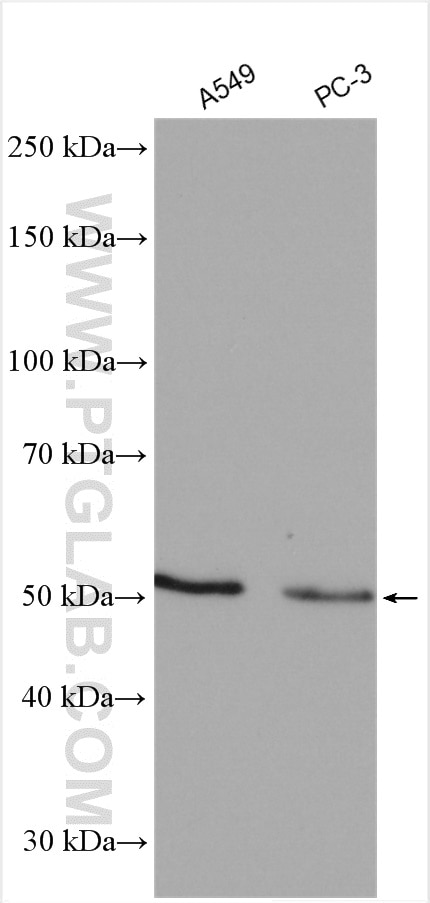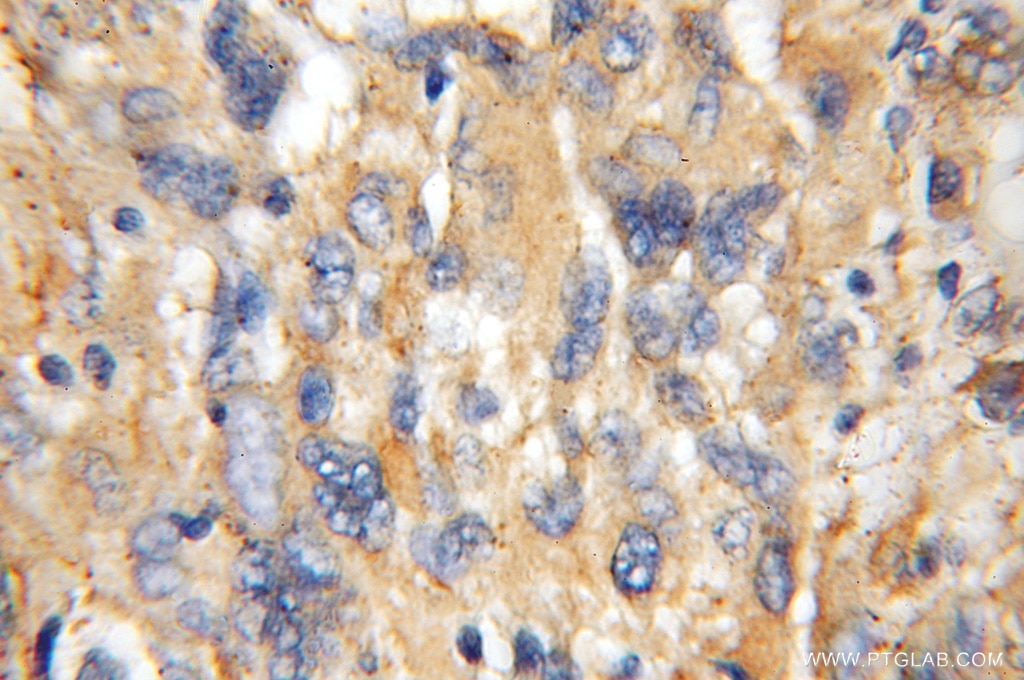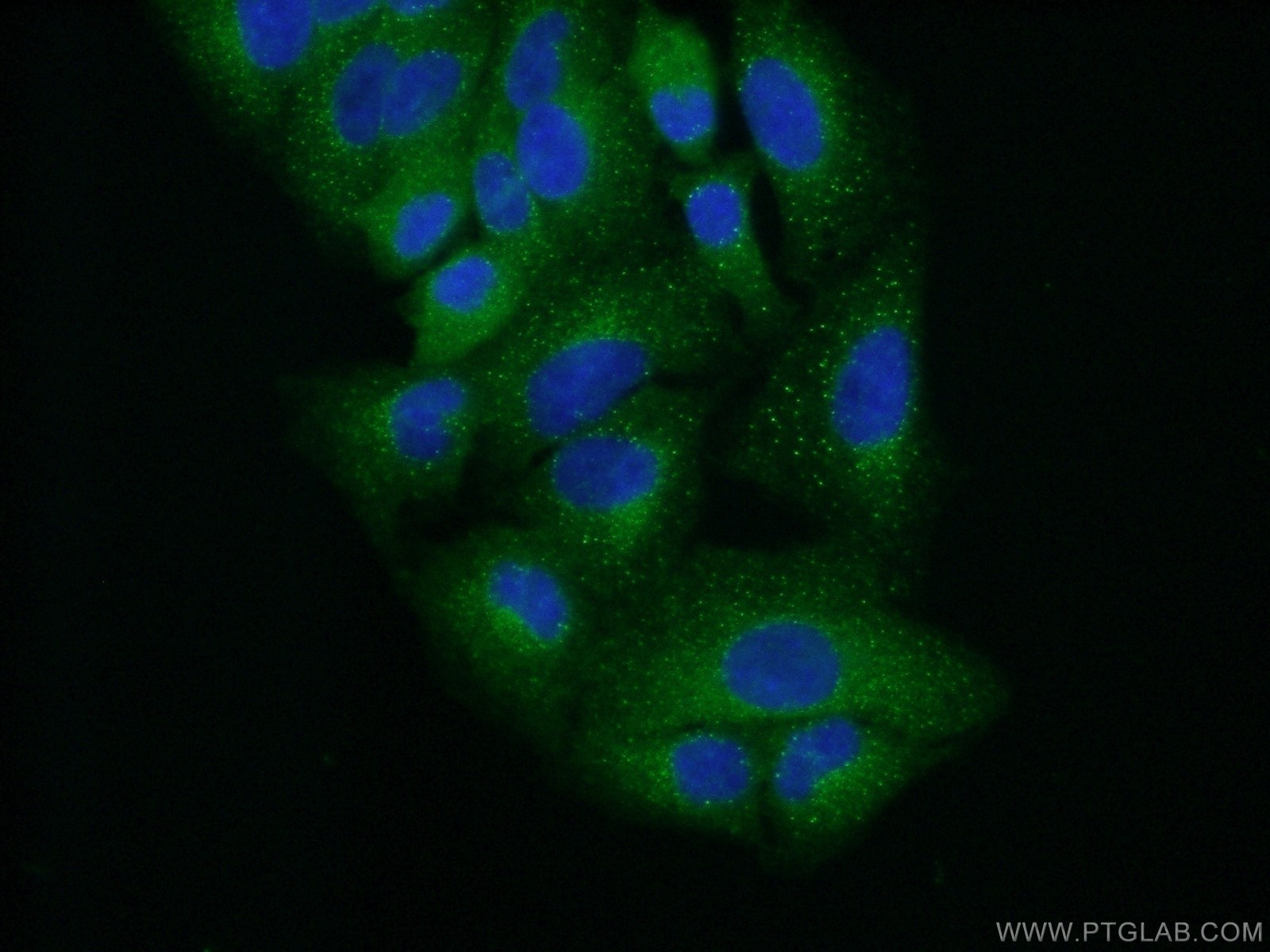Tested Applications
| Positive WB detected in | A549 cells, PC-3 cells |
| Positive IHC detected in | human gliomas tissue Note: suggested antigen retrieval with TE buffer pH 9.0; (*) Alternatively, antigen retrieval may be performed with citrate buffer pH 6.0 |
| Positive IF/ICC detected in | A549 cells |
Recommended dilution
| Application | Dilution |
|---|---|
| Western Blot (WB) | WB : 1:500-1:2000 |
| Immunohistochemistry (IHC) | IHC : 1:20-1:200 |
| Immunofluorescence (IF)/ICC | IF/ICC : 1:50-1:500 |
| It is recommended that this reagent should be titrated in each testing system to obtain optimal results. | |
| Sample-dependent, Check data in validation data gallery. | |
Published Applications
| KD/KO | See 2 publications below |
| WB | See 4 publications below |
| IF | See 3 publications below |
Product Information
11571-1-AP targets TFG in WB, IHC, IF/ICC, ELISA applications and shows reactivity with human, mouse, rat samples.
| Tested Reactivity | human, mouse, rat |
| Cited Reactivity | human, mouse |
| Host / Isotype | Rabbit / IgG |
| Class | Polyclonal |
| Type | Antibody |
| Immunogen |
CatNo: Ag2151 Product name: Recombinant human TFG protein Source: e coli.-derived, PGEX-4T Tag: GST Domain: 1-400 aa of BC023599 Sequence: MNGQLDLSGKLIIKAQLGEDIRRIPIHNEDITYDELVLMMQRVFRGKLLSNDEVTIKYKDEDGDLITIFDSSDLSFAIQCSRILKLTLFVNGQPRPLESSQVKYLRRELIELRNKVNRLLDSLEPPGEPGPSTNIPENDTVDGREEKSASDSSGKQSTQVMAASMSAFDPLKNQDEINKNVMSAFGLTDDQVSGPPSAPAEDRSGTPDSIASSSSAAHPPGVQPQQPPYTGAQTQAGQIEGQMYQQYQQQAGYGAQQPQAPPQQPQQYGIQYSASYSQQTGPQQPQQFQGYGQQPTSQAPAPAFSGQPQQLPAQPPQQYQASNYPAQTYTAQTSQPTNYTVAPASQPGMAPSQPGAYQPRPGFTSLPGSTMTPPPSGPNPYARNRPPFGQGYTQPGPGYR Predict reactive species |
| Full Name | TRK-fused gene |
| Calculated Molecular Weight | 400 aa, 43 kDa |
| Observed Molecular Weight | 50-55 kDa |
| GenBank Accession Number | BC023599 |
| Gene Symbol | TFG |
| Gene ID (NCBI) | 10342 |
| RRID | AB_2203102 |
| Conjugate | Unconjugated |
| Form | Liquid |
| Purification Method | Antigen affinity purification |
| UNIPROT ID | Q92734 |
| Storage Buffer | PBS with 0.02% sodium azide and 50% glycerol, pH 7.3. |
| Storage Conditions | Store at -20°C. Stable for one year after shipment. Aliquoting is unnecessary for -20oC storage. 20ul sizes contain 0.1% BSA. |
Background Information
Protein TFG (TRK-fused gene protein) plays a role in regulating phosphotyrosine-specific phosphatase-1 activity. Mutations in TFG may have important clinical relevance for current therapeutic strategies to treat metastatic melanoma. Defects in TFG are a cause of thyroid papillary carcinoma (TPC), a common tumor of the thyroid that typically arises as an irregular, solid or cystic mass from otherwise normal thyroid tissue. Hereditary motor and sensory neuropathy with proximal dominant involvement (HMSN-P) is an autosomal-dominant neurodegenerative disorder characterized by widespread fasciculations, proximal-predominant muscle weakness, and atrophy followed by distal sensory involvement. Recent genetic investigation indicates that formation of TFG-containing cytoplasmic inclusions and concomitant mislocalization of TAR DNA-binding protein 43 kDa (TDP-43) underlie motor neuron degeneration in HMSN-P. Pathological overlap of proteinopathies involving TFG and TDP-43 highlights a new pathway leading to motor neuron degeneration.
Protocols
| Product Specific Protocols | |
|---|---|
| IF protocol for TFG antibody 11571-1-AP | Download protocol |
| IHC protocol for TFG antibody 11571-1-AP | Download protocol |
| WB protocol for TFG antibody 11571-1-AP | Download protocol |
| Standard Protocols | |
|---|---|
| Click here to view our Standard Protocols |
Publications
| Species | Application | Title |
|---|---|---|
Cell Res A new type of ERGIC-ERES membrane contact mediated by TMED9 and SEC12 is required for autophagosome biogenesis.
| ||
Redox Biol Selenoprotein K contributes to CD36 subcellular trafficking in hepatocytes by accelerating nascent COPII vesicle formation and aggravates hepatic steatosis | ||
Neurobiol Dis Evidence of TRK-Fused Gene (TFG1) function in the ubiquitin-proteasome system.
| ||
J Med Genet Novel TFG mutation causes autosomal-dominant spastic paraplegia and defects in autophagy | ||
Muscle Nerve Muscle pathology of hereditary motor and sensory neuropathy with proximal dominant involvement with TFG mutation. | ||
Commun Biol A pore-forming protein drives macropinocytosis to facilitate toad water maintaining. |








